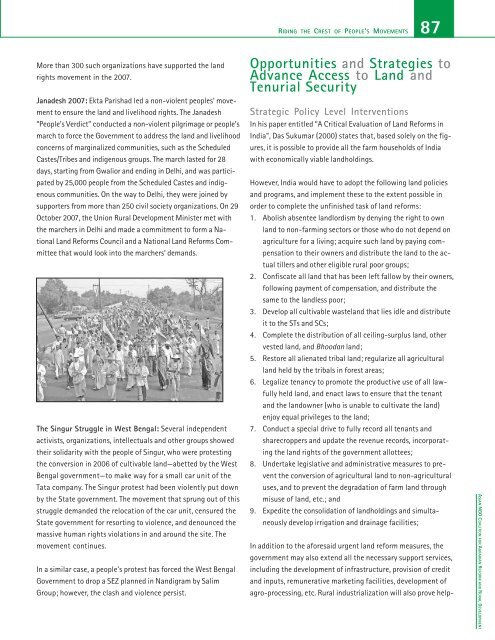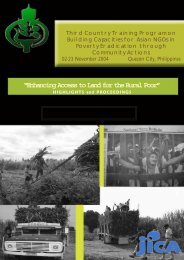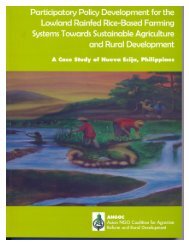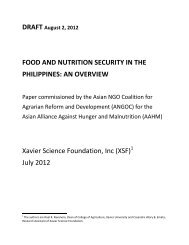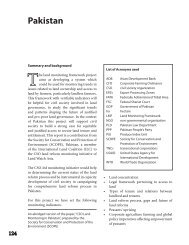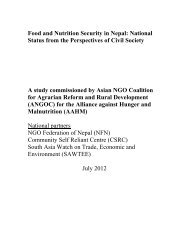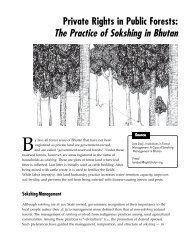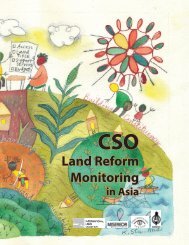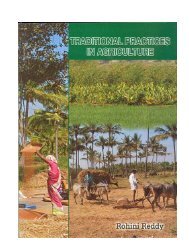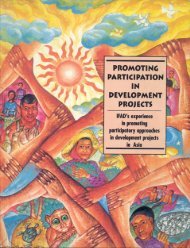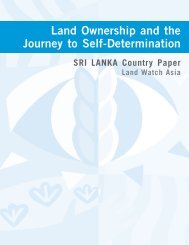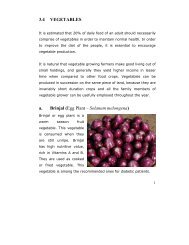Securing the Right to Land FULL - ANGOC
Securing the Right to Land FULL - ANGOC
Securing the Right to Land FULL - ANGOC
You also want an ePaper? Increase the reach of your titles
YUMPU automatically turns print PDFs into web optimized ePapers that Google loves.
More than 300 such organizations have supported <strong>the</strong> land<br />
rights movement in <strong>the</strong> 2007.<br />
Janadesh 2007: Ekta Parishad led a non-violent peoples’ movement<br />
<strong>to</strong> ensure <strong>the</strong> land and livelihood rights. The Janadesh<br />
“People’s Verdict” conducted a non-violent pilgrimage or people’s<br />
march <strong>to</strong> force <strong>the</strong> Government <strong>to</strong> address <strong>the</strong> land and livelihood<br />
concerns of marginalized communities, such as <strong>the</strong> Scheduled<br />
Castes/Tribes and indigenous groups. The march lasted for 28<br />
days, starting from Gwalior and ending in Delhi, and was participated<br />
by 25,000 people from <strong>the</strong> Scheduled Castes and indigenous<br />
communities. On <strong>the</strong> way <strong>to</strong> Delhi, <strong>the</strong>y were joined by<br />
supporters from more than 250 civil society organizations. On 29<br />
Oc<strong>to</strong>ber 2007, <strong>the</strong> Union Rural Development Minister met with<br />
<strong>the</strong> marchers in Delhi and made a commitment <strong>to</strong> form a National<br />
<strong>Land</strong> Reforms Council and a National <strong>Land</strong> Reforms Committee<br />
that would look in<strong>to</strong> <strong>the</strong> marchers’ demands.<br />
The Singur Struggle in West Bengal: Several independent<br />
activists, organizations, intellectuals and o<strong>the</strong>r groups showed<br />
<strong>the</strong>ir solidarity with <strong>the</strong> people of Singur, who were protesting<br />
<strong>the</strong> conversion in 2006 of cultivable land—abetted by <strong>the</strong> West<br />
Bengal government—<strong>to</strong> make way for a small car unit of <strong>the</strong><br />
Tata company. The Singur protest had been violently put down<br />
by <strong>the</strong> State government. The movement that sprung out of this<br />
struggle demanded <strong>the</strong> relocation of <strong>the</strong> car unit, censured <strong>the</strong><br />
State government for resorting <strong>to</strong> violence, and denounced <strong>the</strong><br />
massive human rights violations in and around <strong>the</strong> site. The<br />
movement continues.<br />
In a similar case, a people’s protest has forced <strong>the</strong> West Bengal<br />
Government <strong>to</strong> drop a SEZ planned in Nandigram by Salim<br />
Group; however, <strong>the</strong> clash and violence persist.<br />
RIDING THE CREST OF PEOPLE’S MOVEMENTS<br />
87<br />
Opportunities and Strategies <strong>to</strong><br />
Advance Access <strong>to</strong> <strong>Land</strong> and<br />
Tenurial Security<br />
Strategic Policy Level Interventions<br />
In his paper entitled “A Critical Evaluation of <strong>Land</strong> Reforms in<br />
India”, Das Sukumar (2000) states that, based solely on <strong>the</strong> figures,<br />
it is possible <strong>to</strong> provide all <strong>the</strong> farm households of India<br />
with economically viable landholdings.<br />
However, India would have <strong>to</strong> adopt <strong>the</strong> following land policies<br />
and programs, and implement <strong>the</strong>se <strong>to</strong> <strong>the</strong> extent possible in<br />
order <strong>to</strong> complete <strong>the</strong> unfinished task of land reforms:<br />
1. Abolish absentee landlordism by denying <strong>the</strong> right <strong>to</strong> own<br />
land <strong>to</strong> non-farming sec<strong>to</strong>rs or those who do not depend on<br />
agriculture for a living; acquire such land by paying compensation<br />
<strong>to</strong> <strong>the</strong>ir owners and distribute <strong>the</strong> land <strong>to</strong> <strong>the</strong> actual<br />
tillers and o<strong>the</strong>r eligible rural poor groups;<br />
2. Confiscate all land that has been left fallow by <strong>the</strong>ir owners,<br />
following payment of compensation, and distribute <strong>the</strong><br />
same <strong>to</strong> <strong>the</strong> landless poor;<br />
3. Develop all cultivable wasteland that lies idle and distribute<br />
it <strong>to</strong> <strong>the</strong> STs and SCs;<br />
4. Complete <strong>the</strong> distribution of all ceiling-surplus land, o<strong>the</strong>r<br />
vested land, and Bhoodan land;<br />
5. Res<strong>to</strong>re all alienated tribal land; regularize all agricultural<br />
land held by <strong>the</strong> tribals in forest areas;<br />
6. Legalize tenancy <strong>to</strong> promote <strong>the</strong> productive use of all lawfully<br />
held land, and enact laws <strong>to</strong> ensure that <strong>the</strong> tenant<br />
and <strong>the</strong> landowner (who is unable <strong>to</strong> cultivate <strong>the</strong> land)<br />
enjoy equal privileges <strong>to</strong> <strong>the</strong> land;<br />
7. Conduct a special drive <strong>to</strong> fully record all tenants and<br />
sharecroppers and update <strong>the</strong> revenue records, incorporating<br />
<strong>the</strong> land rights of <strong>the</strong> government allottees;<br />
8. Undertake legislative and administrative measures <strong>to</strong> prevent<br />
<strong>the</strong> conversion of agricultural land <strong>to</strong> non-agricultural<br />
uses, and <strong>to</strong> prevent <strong>the</strong> degradation of farm land through<br />
misuse of land, etc.; and<br />
9. Expedite <strong>the</strong> consolidation of landholdings and simultaneously<br />
develop irrigation and drainage facilities;<br />
In addition <strong>to</strong> <strong>the</strong> aforesaid urgent land reform measures, <strong>the</strong><br />
government may also extend all <strong>the</strong> necessary support services,<br />
including <strong>the</strong> development of infrastructure, provision of credit<br />
and inputs, remunerative marketing facilities, development of<br />
agro-processing, etc. Rural industrialization will also prove help-<br />
ASIAN NGO COALITION FOR AGRARIAN REFORM AND RURAL DEVELOPMENT


